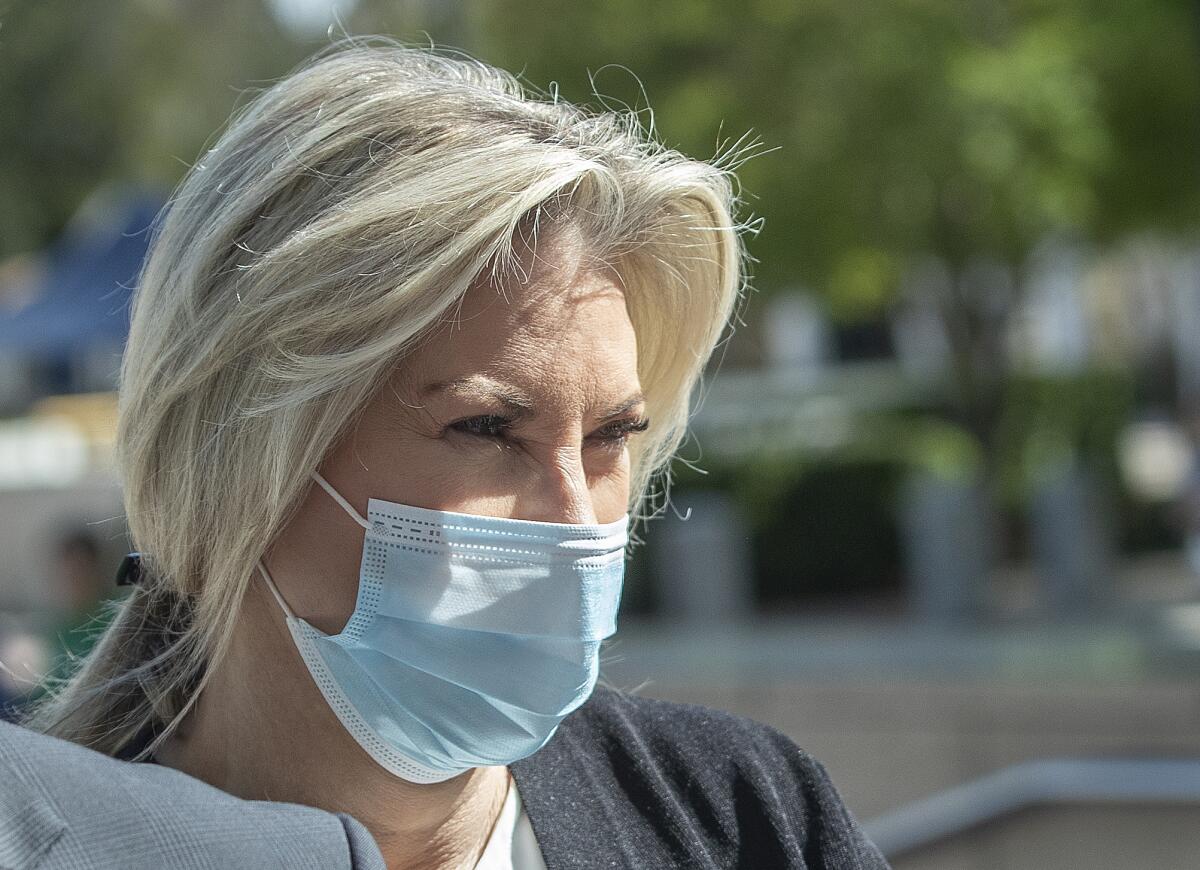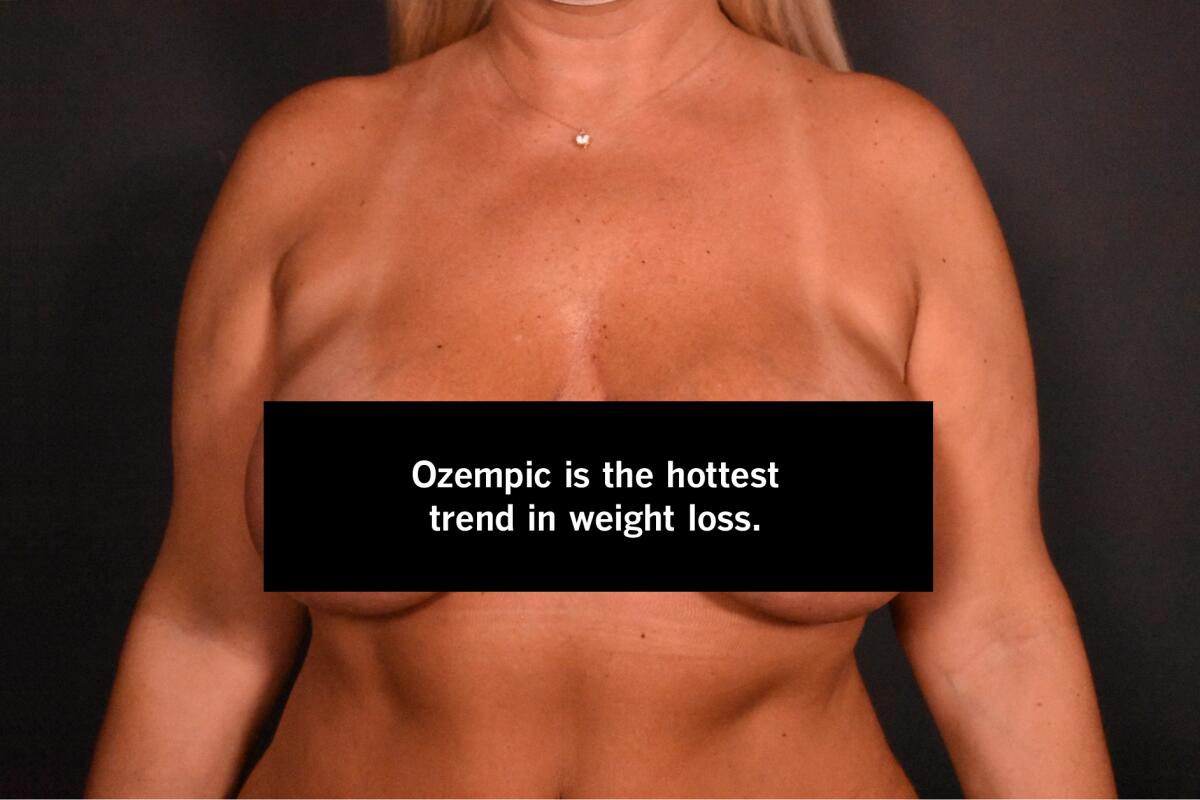Grossman murder trial nears conclusion: Here’s what you need to know

- Share via
Good morning. It’s Thursday, Feb. 22. Here’s what you need to know to start your day.
- Closing arguments conclude in the Rebecca Grossman trial; jury verdict looms
- A new storm is brewing for SoCal next week
- A Hollywood nightlife boom brings back one of L.A.’s oldest gay bars
- And here’s today’s e-newspaper
Sign up for Essential California
The most important California stories and recommendations in your inbox every morning.
You may occasionally receive promotional content from the Los Angeles Times.
Did she commit murder?
The high-profile trial of Rebecca Grossman in the 2020 collision that killed Mark and Jacob Iskander, 11 and 8, at a Westlake Village crosswalk, approaches its conclusion after closing arguments Wednesday.
Soon, a jury will determine the Hidden Hills woman’s fate as she faces two counts of second-degree murder, two counts of vehicular manslaughter with gross negligence, and one count of hit-and-run driving resulting in death. If found guilty on all charges, she could face 34 years to life in prison.
Grossman, 60, was a prominent figure in the local community. Alongside her husband, Dr. Peter Grossman, she founded the Grossman Burn Foundation.
Times staff writer Richard Winton has covered the six-week trial that has included unsettling details, emotional outbursts and witness testimony. Here’s a recap of the case.
Grossman’s murder charge
To secure a second-degree murder conviction, prosecutors must prove that Grossman acted with implied malice — knowing her actions could be deadly but disregarding the risk.
She was not charged with driving under the influence. But prosecutors allege Grossman, 60, was impaired. They say she had cocktails with Scott Erickson, a former Dodgers pitcher, and then raced with him — he in his black Mercedes SUV and she in her white Mercedes SUV — along Triunfo Canyon Road until they reached a crosswalk where she fatally struck the Iskander brothers.
A breathalyzer test conducted at the scene revealed Grossman’s blood-alcohol level to be around 0.075%; a subsequent blood test conducted three hours later showed the level at 0.08%, California’s legal limit. Additionally, traces of Valium were found in her system, two criminalists testified.
The judge denied her legal team’s request to dismiss the murder charges, ruling prosecutors had presented enough evidence showing voluntary intoxication and driving at a high speed.
Prosecutors said in court she reached a speed of 81 mph before lightly braking, then slamming into the boys at 73 mph, sending one child flying into the air. After striking the children, she did not stop until safety features on her car shut it down, according to the prosecution.
A crash expert testified that Grossman could have avoided hitting the boys if she had been traveling the posted limit of 45 mph because they already would have been at the curb.
Prosecutors highlighted Grossman’s awareness of the deadly consequences of speeding, saying she was warned of the risks when she was ticketed for going 92 mph on the 101 Freeway in 2013.
The defense’s argument
Grossman’s defense team argued that Erickson — not Grossman — was the first to strike the boys. Crash reconstruction experts for the defense have testified that Erickson’s black Mercedes SUV hit the boys first, sending Mark over his vehicle and onto the hood of Grossman’s vehicle.
Erickson faced a misdemeanor count of reckless driving in connection with the fatal crash. That was dismissed after he made a public service announcement about the importance of safe driving.
During closing arguments Wednesday, defense attorneys continued to point the finger at Erickson. “If you have doubt that the black car hit one of those children, this case is over,” said Grossman’s lead attorney, Tony Buzbee.
Her attorney presented witnesses who testified that she drove responsibly, wasn’t impaired and traveled at no more than 52 mph. The defense also contends that the collision occurred outside the crosswalk.
Grossman informed the judge that she would not be testifying in the trial.
Alexis Grossman, her daughter, shared tearful testimony that bolstered the defense’s argument that Erickson was at fault.
After closing argument rebuttals, the case is expected to go to the jury Thursday.
Murder charges in car deaths are uncommon
California criminal law generally categorizes vehicular killings under manslaughter — “the unlawful killing of a human being without malice.”
Several law experts discussed why vehicular murder charges are a rarity with Essential California’s Ryan Fonseca in November.
Several notable instances of drivers facing murder charges have made headlines recently.
A nurse faces multiple murder charges in a high-speed crash that killed five people two years ago. Additionally, in October, a man was charged with four counts of murder after his involvement in a high-speed crash that killed four Pepperdine students along Pacific Coast Highway.
The critical distinction between murder and manslaughter lies in the prosecutor’s ability to prove intent. Murder is described as a deliberate act, while manslaughter typically involves recklessness or negligence.
Prosecutors can charge someone with murder if it is believed they acted with implied malice, such as drunk driving, according to the California Supreme Court.
County prosecutors evaluate each incident “on a case-by-case basis,” the district attorney’s office said, with determining factors including:
- Speed (and speed limit)
- Driving pattern
- Location of the incident (residential versus commercial, surface streets versus freeways, school zones)
- Driving under the influence
- Driving history
- Driver’s prior warning history
Today’s top stories

Climate and environment
- After heavy storms, Death Valley is now open to kayakers: The return of ghostly Lake Manly.
- It’s not just toxic chemicals. Radioactive waste was also dumped off Los Angeles coast.
- ‘Snow drought’ eases as storms bring California near-average water supplies.
- Epic downgrade: Hilary was not a tropical storm when it pummeled California, experts say.
Crime and courts
- A judge again dismisses charges against members of a California white nationalist group.
- A Riverside County pastor was arrested on child sexual assault charges.
- A criminal case over handwritten lyrics to ‘Hotel California’ goes to trial.
- A California bill proposes new standards for court-ordered parenting classes after Times investigation.
- The ‘Rust’ movie shooting trial begins after a bumpy road to prosecution.
More big stories
- The rain’s not over yet —a new storm is brewing for SoCal next week. How much rain could we get?
- Biden, at a Los Angeles fundraiser, says the 2024 election offers a stark choice.
- Capital One will acquire Discover for $35.3 billion. What does the deal mean for you?
- Single-payer healthcare is a ‘tough, tough sell’ as California faces $73-billiion deficit.
- Hold ’em! Beyoncé makes history as she tops Billboard’s country-music chart.
- Thirteen pit bulls were euthanized, including eight puppies, after the owner is mauled to death.
- Oversight investigators find deputy gang ‘logo’ outside the Los Angeles women’s jail.
- California’s streak of female senators may be ending — and women appear to be a reason.
- Jason Reitman and a group of directors have bought Westwood’s iconic Village Theater.
Get unlimited access to the Los Angeles Times. Subscribe here.
Commentary and opinions
- Jackie Calmes: I watched a Trump rally so you don’t have to. But you need to know what he’s saying.
- LZ Granderson: On the economy, there’s no comparison between Biden and Trump.
- Editorial: Let the Dodger gondola take flight. L.A. needs more transit options.
- Mark Z. Barabak: Who needs passion or drama? Adam Schiff tries bland and steady in California U.S. Senate race.
Today’s great reads
The new beauty regimen: Lose weight with Ozempic, tighten up with cosmetic surgery. Patients taking Ozempic and other trendy injectables are going under the knife to correct the side effects of rapid weight loss, which include sagging skin, hollow cheeks and an aged appearance.
Other great reads
- These entertainment workers could barely make rent. A Hollywood housing complex offers relief.
- ‘Dune: Part Two’ stirs its sands darkly, deepening a sci-fi masterpiece in our midst.
- Inside the NHL’s push to recruit Latino hockey fans and grow the game.
How can we make this newsletter more useful? Send comments to essentialcalifornia@latimes.com.
For your downtime

Going out
- 💆🏽These viral L.A. ‘head spas’ will show you what’s been hiding in your scalp (Ew!)
- 🏳️🌈The Spotlight was one of L.A.’s oldest gay bars. A Hollywood nightlife boom brought it back.
Staying in
- 🎮 Starting Thursday, Lady Gaga will be the face of “Fortnite Festival,” a spinoff rhythm game that launched late last year.
- 🍊🍋 Here are six peak-season citrus recipes.
- ✏️ Get our free daily crossword puzzle, sudoku, word search and arcade games.
And finally ... from our archives

On this day 44 years ago, the underdog U.S. hockey team defeated the four-time defending gold medal-winning Soviet team at the Winter Olympics in Lake Placid, N.Y.
For the 40th anniversary of the historic win, The Times’ Helene Elliott wrote about how the tournament still has a lot of meaning to players and fans.
Have a great day, from the Essential California team
Anthony De Leon, reporting fellow
Kevinisha Walker, multiplatform editor
Stephanie Chavez, deputy metro editor
Check our top stories, topics and the latest articles on latimes.com.
Sign up for Essential California
The most important California stories and recommendations in your inbox every morning.
You may occasionally receive promotional content from the Los Angeles Times.





